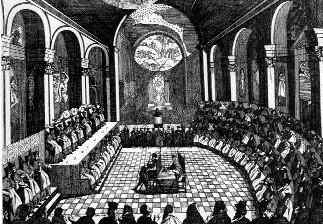Apocrypha are texts of uncertain authenticity, or writings where the authorship is questioned. When used in the specific context of Judeo-Christian theology, the term apocrypha refers to any collection of scriptural texts that falls outside the canon. Given that different denominations have different ideas about what constitutes canonical scripture, there are several different versions of the apocrypha.
Uses of apocrypha developed over the history of Western Christianity. The Gelasian Decree refers to religious works by church fathers Eusebius, Tertullian and Clement of Alexandria as apocrypha. Jerome declared that all books outside the Hebrew canon were apocryphal. The Western Church did not accept Jerome's definition of apocrypha. As a result, various church authorities labeled different books as apocrypha, treating them with varying levels of regard.
Some apocryphal books were included in the Septuagint with little distinction made between them and the rest of the Old Testament. On the other hand, teachers connected with Palestine and familiar with the Hebrew canon excluded from the canon all of the Old Testament not found there. A third view was that the books were not as valuable as the canonical scriptures of the Hebrew collection, but were of value for moral uses, as introductory texts for new converts from paganism, and to be read in congregations.
 These three opinions regarding the apocryphal books prevailed until the Protestant Reformation, when the idea of what constitutes canon became a matter of primary concern for Roman Catholics and Protestants alike. In 1546 the Catholic Council of Trent reconfirmed the canon of Augustine. The Protestants, in comparison, universally held the belief that only the books in the Hebrew collection were canonical. John Wycliffe, a 14th century reformer, had declared in his Biblical translation that "whatever book is in the Old Testament besides these twenty-five shall be set among the apocrypha, that is, without authority or belief". Nevertheless, his translation of the Bible included the apocrypha and the Epistle of the Loadiceans.
These three opinions regarding the apocryphal books prevailed until the Protestant Reformation, when the idea of what constitutes canon became a matter of primary concern for Roman Catholics and Protestants alike. In 1546 the Catholic Council of Trent reconfirmed the canon of Augustine. The Protestants, in comparison, universally held the belief that only the books in the Hebrew collection were canonical. John Wycliffe, a 14th century reformer, had declared in his Biblical translation that "whatever book is in the Old Testament besides these twenty-five shall be set among the apocrypha, that is, without authority or belief". Nevertheless, his translation of the Bible included the apocrypha and the Epistle of the Loadiceans.Many early books about Jesus were not included in the canons, and are now termed apocryphal. Some of them were vigorously suppressed and survive only as fragments. The earliest lists of authentic works of the New Testament were not quite the same as modern lists; for example the Book of Revelation was long regarded as unauthentic, while Shepherd of Hermas was considered genuine by many Christians, and appears in several ancient Bibles.
Excerpted and adapted from: Apocrypha and New Testament apocrypha